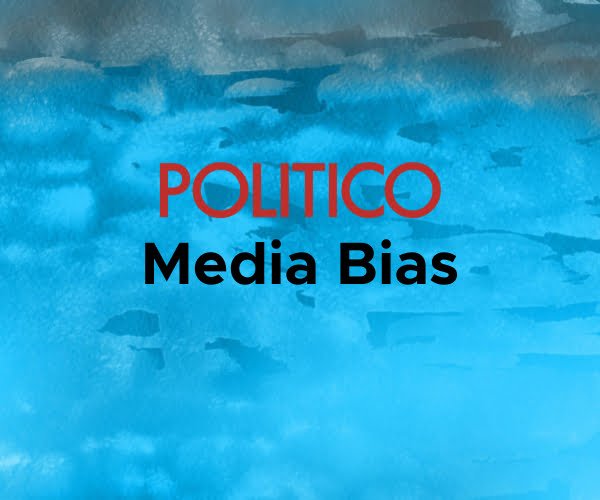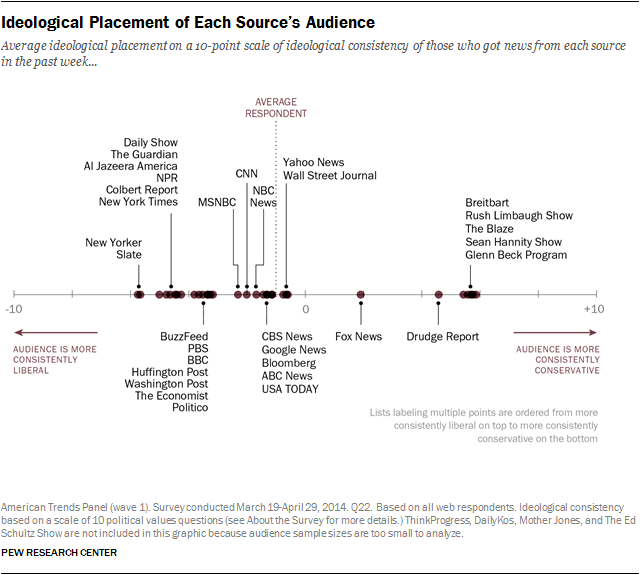
Since its establishment in 2007, Politico has become a prominent and influential news outlet, focusing on politics, policy, and governance in the United States and at international levels. As a leading digital and print publication known for its in-depth coverage, it is essential to examine whether Politico exhibits bias in its reporting.
In recent years, Politico has earned a reputation for having a left-leaning bias, with Pew Research reporting that its audience is on the consistently liberal side of the political spectrum when compared to other prominent news media outlets.

Source: Pew Research
In this article, we will determine whether or not this is true by analyzing work from this publication’s editorial coverage to determine if there is a discernible political bias. By providing a comprehensive analysis, we aim to shed light on the factors that contribute to media bias in general.
How Does Biasly Rate News Sources?
Biasly’s algorithms produce bias ratings to help provide multiple perspectives on given articles. Biasly has analyzed 200,000+ news articles from more than 3,200 news sources through our A.I. technology and team of political analysts to find the most factual, unbiased news stories.
Biasly determines the degree of political bias in news sources by using Biasly’s Bias Meter Rating, in which Biasly’s team analyzes media sources’ reliability and bias and produces three scores, a Reliability Score that measures the accuracy of media sources; an A.I. Bias Score, evaluated by A.I.; and an Analyst Bias Score evaluated by political analysts. These scores are rated based on seven rating metrics including Tone, Tendency, Diction, Author Check, Selection/Omission, Expediency Bias, and Accuracy. These metrics help our analysts to determine the political attitude of the article.
Our A.I. machine-learning system employs natural language processing and entity-specific sentiment analysis to examine individual articles and determine their bias levels. By analyzing the key terms in an article such as policies, biased phrases, political terminologies, politicians, and their nicknames, the algorithms can rate the attitude of the text. Bias scores range from -100% and 100%, with higher negative scores being more liberal and higher positive scores being more conservative, and 0% being neutral.
Is Politico Politically Biased?
Politico’s founding editor, John F. Harris, declared in 2019 to MarketWatch that media bias is real — it’s just not a slant to the left or the right. The true bias, he says, is no bias at all, or the “bias of centrism.” The argument here is that, by presenting both sides of an issue equally, or by aiming for a neutral position, media organizations can unintentionally perpetuate a bias in favor of the status quo or mainstream opinions. This bias may overlook or downplay alternative perspectives or marginalized voices that exist outside of the political center.
Harris’s statement mistakenly assumes that any attempt at presenting a balanced or neutral perspective automatically results in bias. Striving for balance and objectivity is a fundamental principle of journalism. While it’s true that biases can exist within any reporting, it doesn’t mean that all centrist or neutral reporting is biased by default.
To understand Politico’s bias, we can look to Biasly’s AI Media Bias Rating for Politico, which sits at “Moderately Liberal.” Biasly’s Analyst Score also came in at “Somewhat Liberal.” This indicates Politico’s media bias does, in fact, slant to the left, and means one could typically expect the outlet to criticize Republican politicians, policies, and perspectives while praising those affiliating with the Democrat Party. The score given by Biasly matches the scores given by other third-party bias research agencies.
As a reader, your political leaning may influence your opinion of Politico due to Biasly’s rating of them as “Moderately Liberal.” This article will discuss methods for recognizing this bias, allowing you to differentiate between opinions and facts and make more informed decisions when consuming news.
Before we begin, we need to discuss bias. Bias is a natural function of humans, and we can express it both consciously and unconsciously. Bias is one of the most fundamental forms of pattern recognition in humans. This isn’t to lower the bar and say that “all things are biased,” but to explain the process in which we may come to trust certain news organizations that display patterns of coverage.
On the media’s part, there is an incentive to retain audiences, encourage them to purchase subscriptions, and rate products positively. Bias is a two-way street, people want to see news stories about things they care about, and the media needs viewers to continue their operations. This creates a positive feedback loop that influences what stories are covered and from what perspective. This also explains the actions of more liberal news organizations.
Analysis of Bias in Politico Online Articles
When assessing bias, the key metrics typically used are tone, author, and diction. In this article, we will primarily focus on these three metrics. Tone refers to the writer’s attitude, while diction pertains to their word choices. The author metric takes into account the author’s previous articles and social media activity to determine their stance on issues.
The first article we’ll examine is entitled, “The next Republican target: Ballot campaigns.” From the very beginning with the title, the article takes a negative tone to portray the Republican-led legislation as a form of retaliation or revenge (“they were also plotting their revenge”) and characterizes the lawmakers’ actions as “aggressive” and sparking “outcry” from liberal activists. The use of words like “looming proposal,” “fierce outcry,” and “consternation” conveys a negative tone toward the Republican legislators.
The article also uses words and phrases that imply negative motives or actions on the part of Republicans. For example, it describes the legislation as a “wave” intended to “combat” progressive policymaking. It also states that lawmakers are “quietly chipping away” at the citizen-driven referendum process and attempting to “complicate” it. These word choices suggest a negative view of the Republican efforts.
Author bias, in this case, seems to be present, but not a glaring issue. Liz Crampton, the writer of the piece, has positioned herself firmly as a Democrat on her Twitter page, having tweeted and re-tweeted pro-liberal stories, although there is nothing exceptionally inflammatory or anti-Republican about them. She does not engage in online trolling against conservatives or seem to write hit pieces against Republicans, nor does she frequently headline her articles with anything other than factual statements. So although she does have a political bias, she maintains her political credibility online to the extent that people will feel like they can trust what she writes.
This article is one of the more extreme examples, however, as Politico tends to do rather well at keeping biased language out of its articles and letting politicians speak for themselves. Take the following article, for example: “Dems are ‘not particularly pleased’ with the Senate infrastructure deal. They’ll back it anyway.” Rather than the authors taking the position, they use a fairly neutral tone and rely heavily on quotes, using statements from senators on both sides to gauge the mood on the bipartisan infrastructure package without being overly sensational or inflammatory. For example:
“There are a lot of things that are happening that I’m unhappy about. I think they’re mistakes,” said Cardin (D-Md.). “But I’m going to support the package. I think it’s critically important we get the bipartisan package done.”
“What I’m hearing is that Dems could lose 10 to 15 of their progressives,” said Senate Minority Whip John Thune (R-S.D.). “Hopefully they’ll be able to deliver more votes than that.”
The diction used in the article is generally straightforward and factual, with no overtly loaded or biased language. While certain phrases used in the article, like “scintillating reviews” and “through gritted teeth” could be interpreted as slightly subjective, they are contained within quotes from senators themselves.
These articles represent only a tiny fraction of all Politico’s content, but they demonstrate how drastically the media’s bias can vary, which further underscores how critical it is to be able to separate reporting from opinion.
Analysis of Politico Opinion Articles
Factual reporting aims to present impartial and factual information along with direct quotes from primary sources, allowing readers to form their own opinions. On the other hand, columnists use opinions as a platform to express their personal views on current issues. Although the Politico analysis contained some objective reporting, their opinion pieces prioritize expressing a particular viewpoint rather than striving for objectivity.
Take the following article, for example: “Opinion | Hunter Biden Got Special Treatment — Especially Harsh.” This opinion article differs from normal reporting in that it openly expresses the author’s viewpoint and seeks to persuade readers of a particular interpretation of the events. It presents arguments and counters criticisms from Republicans, aiming to shape readers’ opinions rather than providing an objective account of the situation.
The tone of the article is defensive and seeks to refute the criticism from Republicans regarding Hunter Biden’s plea deal. The author argues that Biden was treated harshly and tries to downplay the severity of the charges against him. The overall tone is in defense of Hunter Biden and critical of Republicans.
Likewise, the diction used in the article is subjective and emotive, often favoring the author’s viewpoint. For example, the author uses phrases like “widespread criticism from Republicans,” “slammed it as a ‘sweetheart deal,'” and “accused in right-wing publications of everything from corruption to human trafficking.” These phrases carry a negative connotation and imply bias against Republicans. Additionally, the author uses phrases like “anyone who believes in the rule of law” and “actual federal criminal law experience,” which suggest that those who criticize the plea deal are somehow opposed to the rule of law or lack expertise.
While opinion editorials should not be your only source of news, they can provide diverse perspectives on a range of topics and challenge their beliefs on complex topics. However, you should read a variety of articles on any topic to avoid bias, consume diverse coverage, get multiple interpretations, and make yourself an informed consumer of news media.
Who Owns Politico?
Axel Springer, a German media company, acquired Politico in 2021. Its ideological position favors European integration, NATO, Israel’s right to exist, the open society, and free-market ideologies. It’s important to note that when a media organization is owned by a company with a specific ideological stance, it can potentially influence the editorial direction and content produced.

(Axel Springer is a German media company valued at $5.58B in 2023)
It’s important to understand that media bias is a multifaceted problem that is impacted by various factors. Although ownership can have an influence, it doesn’t necessarily mean that all content created by the company will reflect the owner’s beliefs. The organization’s journalistic standards, editorial guidelines, and journalists’ independence also play a part in shaping the overall editorial stance.
To assess the potential impact of ownership on Politico’s media bias, it is necessary to monitor the organization’s coverage and compare it to other sources. Examining the articles, editorials, and analysis provided by Politico can help evaluate the extent to which the organization’s reporting reflects the stated ideologies of its owner.
It is also worth noting that individual journalists within Politico may hold diverse perspectives, and their reporting might not always align with the owner’s ideologies. Journalists strive for fairness, accuracy, and objectivity in their reporting, and their professional ethics should guide their work. As with any news organization, it is always recommended to consume news from multiple sources and critically evaluate the information presented to form a well-rounded understanding of the topics being covered.
How to Evaluate and Uncover Bias
It can often be difficult to tell if the news you watch is biased. If you have settled on a news channel, it’s usually because you trust the information you are gaining. Unfortunately, many trust the information they are hearing because it confirms what they already believe. This is referred to as “confirmation bias.” It is important to challenge your beliefs and get third-party verification that what you are hearing is the full story. This is why we recommend using Biasly to compare different news stories side-by-side using our bias ratings to figure out what both sides think of a political issue.
It should be noted that although Politico received a Somewhat Liberal score from Biasly, bias may vary from article to article. Politico has published not only liberal viewpoints but also centrist and conservative-leaning pieces in the past. Additionally, the level of bias can differ depending on the article type, with general news articles being less biased than opinion pieces. It’s crucial to keep in mind that every article has some level of bias, but some are more factual than others. By using Biasly’s News Check, you can confidently determine the bias of what you’re reading.


























